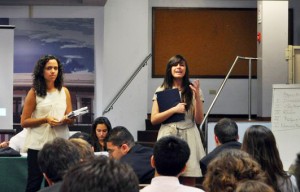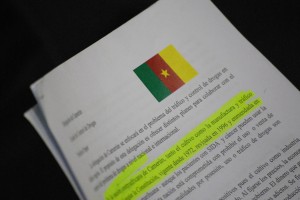In recent years it has become common knowledge that dominating a language beyond one’s native tongue holds countless cognitive benefits. What those advantages are, exactly, tend to be less identifiable, however. Nevertheless, it is evident that monolinguals are at a disadvantage when compared to their polyglot counterparts. In terms of Model United Nations, this holds especially true.

One delegate passionately debates in Arabic while her co-delegate translates (Photo credit: Lamis Alkhatib)
1. You will improve your cognitive skills
Last year, the New York Times published an Op-Ed piece discussing the benefits of exposing children to a multilingual environment from an early stage in their lives. Though the article discusses the ability of children to color-code blocks, the broader meaning behind this scientific discovery is very relevant to those wishing to hone their skills in Model UN and other intellectual pursuits. Speaking two or more languages requires the ability to “mentally multitask” and think on your feet. If you debate in a circuit where a good number of delegates are making their points in another language, you too will be forced to synthesize information quickly if you intend to be fully engaged in the discussion. This exercises your mental muscles and enables you to produce better quality material, whether written or spoken.
2. You will increase your ability to multitask
As a result of this increased mental ability, those who speak multiple languages will find that multitasking—an essential skill in Model UN—comes more naturally. However, merely speaking another tongue will not help you. Some, for example, speak one language at home and another at school or work, and will therefore create a mental separation between the two. This makes it harder to switch from one language to the other. Debating in an active committee in Model UN, however, will break down those barriers. In my experience, I might listen to a speaker in Spanish, ask the delegate a question in English, and write notes on the response in Arabic script (a great way to repel prying eyes!).
This linguistic acrobatics in turn aids me in keeping track of different events that occur in committee as well as mentally organizing my debate points. More often than not, writing down speeches is not very prudent, but bullet points might not accurately capture the essence of your speech. If you hone your multitasking skills, however, you will be able to convert simple bullet points into eloquent discourses without losing what you had to say.

A delegate speaking in English stands beside the committee’s agenda, which is written in Spanish (Photo credit: Ana Mercedes Colón)
3. You will expand your linguistic abilities
Many, if not most people never had the experience of growing up in a bilingual atmosphere. If you do have some basis in a foreign language, however (such as one you might acquire from taking a class), competing in a bilingual committee is an ideal way improve your linguistic skills. The idea may seem daunting, at first, and it is true that your chances of winning an award might be hurt, but the long-term gain provided to you would be insurmountable. One might go through all of high school staring at blackboards filled with lists of verb conjugations and adverbial phrases, but never acquire the proficiency needed to carry out a conversation in a foreign language. This is because immersion—and above all—interaction is key in this process. Anyone who has attended a Model UN conference knows that there is plenty of both to go around!
4. You will become a better researcher
The advent of the internet brought with it a revolution in how we access information. Instead of having to drag yourself to the library and thumb through scores of tomes that might be relevant, you can get what you need in the click of a mouse. This vast impact of this tool notwithstanding, it has its limits. Online information will not always be in a language you understand. This is especially true if you are researching an obscure topic from the perspective of a nation whose culture is remote from your own. For example, when researching El Salvador’s policy regarding genetically modified foods, knowing Spanish comes in handy. Not only would you be able to pour over government documents concerning the subject, but you even have the option of contacting Salvadoran government officials with questions (the probability of you getting a response from any official might be slim, but if you contact them in a language that they do not speak, your chances are next to zero). If your language skills are not stellar to begin with, participating in a multilingual circuit will improve them enough so that you may take advantage of these resources.
5. You will broaden your appreciation for other cultures
There is much truth to the saying “to know a culture, learn the language.” Beyond the various rules of syntax and composition that accompany any language lies the fabric of a people. The formation of any language can, in fact, be quite revealing about those who speak it. This, of course, is invaluable to a Model UN delegate. Learning about cultures is our modus operandi. Consider the phrase “to play an instrument.” To the native English speaker, this clearly refers to the act of making music with an instrument. The Spanish translation, however, is “tocar un instrumento.” The word “tocar” literally means “to touch.” To an English speaker, it would seem that this might be silly phrasing since, in theory, one can touch an instrument without playing it. But perhaps this indicates that in the Spanish-speaking world, the relationship between a musician and his or her instrument is viewed differently. There exist countless examples such as this one, and though nuanced at times, they are crucial to understanding the nations you represent in committee.
While the United Nations limits itself to five official languages, there of course exist hundreds more, each representing an array of distinct cultures. As Model UN delegates, it should be in our interest acquire more knowledge about these cultures through the different languages of the world. Not only does it personally enriching, but it becomes an invaluable asset when debating issues of global import.

Delegates in Puerto Rico’s “Federación” are free to write their position papers in English or Spanish and speak in either during committee (Photo credit: Ana Mercedes Colón)

